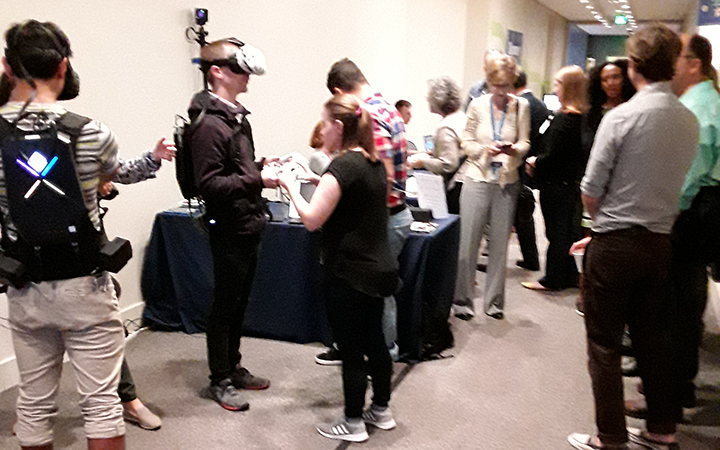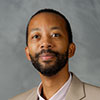This article is more than 5 years old.
For the month of October, I attended two conferences: the Smithsonian Digitization Conference and the NCLA Conference.
2019 Smithsonian Digitization Conference
This event was held earlier in the month from October 1-3 in Washington, DC.
The conference theme was “Engagement”. This reflected the Smithsonian’s new five-year strategic plan (Smithsonian 2022: Greater Reach, Greater Relevance, Profound Impact) to reach 1 billion people a year mostly through digitization. The organization is working to accomplish this through various digitization efforts. The first day kicked off with a range of exhibits that primarily featured displays and demonstrations of the various digitization projects that the Smithsonian is undertaking.
Most of the exhibits consisted of 3D and virtual reality technology, such as the 3D Program, which uses both technologies to broaden access to the Smithsonian’s vast physical collections. Also, since 2016, the Smithsonian has provided an online digitization on demand service of their print, audio and video materials. The kind folks at this table discussed workflows and integration of software. There were about 10 exhibits overall.

In addition to the keynote addresses, the next two days were devoted to presentations and panels, which fell under one of seven subthemes: entertainment, education, research, response, accessibility, bridging communities, and creativity. The format consisted of three to four panelists, who each provided a short individual presentation on their recent projects or relevant work. This was followed by a Q&A session with the panelists by a moderator and followed up by questions from the audience.
During the Research panel, an interesting point was made about being wary of using cutting edge software and file formats for preservation–particularly of proprietary nature. “Those are the most dangerous formats,” said Alexander Rose, the executive director of The Long Now Foundation. He mentioned that the U.S. government does not enforce the use of cutting edge technology for good reason–particularly with NASA. For example, NASA uses decades old cameras, sensors and data systems in their probes before they are even launched. But the technology is anticipated to last over time. The Voyager 2 probe launched in 1977 and is still sending data back to Earth.
“Everything is burning,” is my most standout quote of the conference made by Rachel Goslins, the director of the Arts and Industries Building at the Smithsonian. She was referring to how materials undergo oxidation.
Other speakers talked throughout the conference about video game preservation and emulation, sharing datasets, the use of neural networks for image collections, algorithmic bias, and more.
The conference concluded with a closing keynote by Christin Murphy, who talked about digitizing animal specimens for research and the development of 3D objects. Murphy is a marine biologist at the Naval Undersea Warfare Center Division. Although there is a growing push to make 3D images of animal specimens available, she said that many researchers are still unaware that these resources are available. She has a similar TEDx talk about the topic here.
2019 NCLA Conference
I’ve always enjoyed attending the NCLA conferences, and this year was no exception.
Much of my time at the conference was serving as a volunteer coordinator. It was illuminating to see what transpires behind the scenes during the conference.
I attended the opening keynote by Melanie Huggins, the executive director of Richland Library in South Carolina, who illustrated impressive renovations and new buildings within their public library system. I also attended the Ogilvie Lecture featuring Wanda Brown and state librarian Timothy Owens.
After the session, “Find It and Use it for Free,” I was prompted to be a more frequent visitor of the North Carolina Digital Collections. Denise Jones and Andrea Gabriel presented some of their key resources from the state’s digital collections, and also some unique ways that they are promoting their collection. One such endeavor is their “Connecting the Docs” series. It uses their archival records to reveal intriguing stories. The first season of the series, entitled “Murder, Mystery, and Mayhem” includes 4 stories over the span of 9 episodes. Barbara Ferry from Smithsonian Libraries held a similar session where she showcased available digital resources and services available to the public.
“Let’s Talk Student Workers,” was an informal discussion led by Artanza Williams that I also attended on Thursday. This was primarily for managers of student workers at academic libraries. It was a great session to see how other library staff hire, train and manage student workers.
The highlight of the conference for me was Thursday evening during the All Conference Reception, which marked the completion of my time with the NCLA Leadership Institute. Our cohort received plaques during the awards presentations. The final event I attended was the luncheon and closing keynote by Jaki Shelton Green.
I’m looking forward to the next NCLA Conference when it returns to Winston-Salem in 2021.

6 Comments on ‘October 2019 Conferences: Smithsonian & NCLA’
Thanks for this report, Mel! The Smithsonian conference sounds awesome, and it is really interesting to look through the Smithsonian’s strategic plan. Especially interesting for me is their digital-first outreach strategy. Thanks for sharing!
Your conference experiences sound very rewarding. Thanks for this report from the field, especially about the dangers of proprietary software and the information on oxidation.
I am looking forward to exploring how we integrate 3-D technology into SCA work!
Wonderful! Sounds like a busy and interesting October.
Fascinating information from your Smithsonian conference! I appreciate the point that yes, everything is indeed burning, paired with the caution against cutting-edge technologies due to preservation challenges. It’s a balance that is difficult to strike, but one we must figure out. I hope to see ZSR’s digital collections incorporating 3D soon! And congrats on your NCLA Leadership participation!
“Connecting the Docs” sounds especially relevant to my interests – thanks for sharing about your conference, and thank you for your NCLA work and contributions!